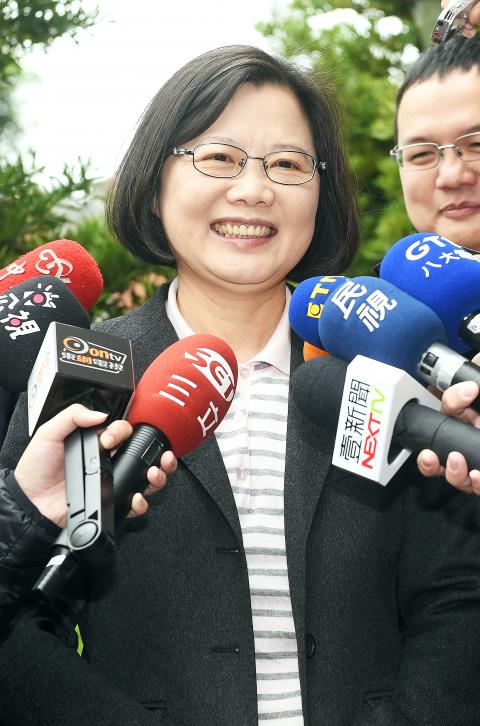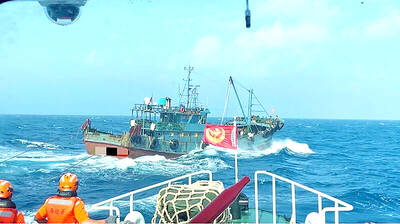Democratic Progressive Party (DPP) Chairperson and presidential candidate Tsai Ing-wen (蔡英文) yesterday said that keeping cross-strait relations stable is a shared objective, adding that all concerned parties should sit and negotiate a solution acceptable to all involved.
“I can feel that everyone is concerned about how the DPP — and I — will handle China affairs. We are working hard to take care of the issue, hoping to maintain cross-strait stability and peace under very complicated circumstances, while defending Taiwan’s interests at the same time, and allow Taiwanese to have more options,” Tsai said. “We want to do it well, and it needs time, and we have been in good communication with different parties.”
Tsai made the remarks in response to reporters’ questions about comments made on Friday at a conference on cross-strait relations hosted by the Heritage Foundation in Washington by former American Institute in Taiwan (AIT) managing director Barbara Schrage.

Photo: Chien Jung-fong, Taipei Times
Schrage reportedly said that Tsai was unable to clarify Washington’s doubts about her China policy when she visited the US in September 2011 as the DPP’s candidate for the 2012 presidential election, and urged Tsai to present something new that would ease the concerns of China and the US.
Tsai — who is expected to be her party’s candidate in next year’s presidential election — is expected to have a chance to elucidate her stance in a visit to Washington set for later this year, Schrage said, adding that if Tsai cannot present something new, she would not be able to pass the test easily.
Schrage retired in January last year from the position she had held since 2006.
Asked if she considers Schrage’s remarks as US interference with Taiwan’s election, Tsai yesterday reaffirmed that she believes that the US will remain neutral, since it “has repeatedly stressed that it would not interfere in our election.”
Tsai said that stability and peace in cross-strait relations is beneficial to all parties and thus everyone should work together to find a solution that is acceptable to all and beneficial to the people of Taiwan.
“Rather than saying it is intervention or influencing, I suggest that we all sit down and talk,” Tsai said.

POLITICAL AGENDA: Beijing’s cross-strait Mid-Autumn Festival events are part of a ‘cultural united front’ aimed at promoting unification with Taiwan, academics said Local authorities in China have been inviting Taiwanese to participate in cross-strait Mid-Autumn Festival celebrations centered around ideals of “family and nation,” a move Taiwanese academics said politicizes the holiday to promote the idea of “one family” across the Taiwan Strait. Sources said that China’s Fujian Provincial Government is organizing about 20 cross-strait-themed events in cities including Quanzhou, Nanping, Sanming and Zhangzhou. In Zhangzhou, a festival scheduled for Wednesday is to showcase Minnan-language songs and budaixi (布袋戲) glove puppetry to highlight cultural similarities between Taiwan and the region. Elsewhere, Jiangsu Province is hosting more than 10 similar celebrations in Taizhou, Changzhou, Suzhou,

The Republic of China (ROC) is celebrating its 114th Double Ten National Day today, featuring military parades and a variety of performances and speeches in front of the Presidential Office in Taipei. The Taiwan Taiko Association opened the celebrations with a 100-drummer performance, including young percussionists. As per tradition, an air force Mirage 2000 fighter jet flew over the Presidential Office as a part of the performance. The Honor Guards of the ROC and its marching band also heralded in a military parade. Students from Taichung's Shin Min High School then followed with a colorful performance using floral imagery to represent Taiwan's alternate name

COGNITIVE WARFARE: Chinese fishing boats transmitting fake identification signals are meant to test Taiwan’s responses to different kinds of perceived incursions, a report said Chinese vessels are transmitting fake signals in Taiwan’s waters as a form of cognitive warfare, testing Taipei’s responses to various types of incursions, a report by the Institute for the Study of War said on Friday. Several Chinese fishing vessels transmitted fake automatic identification system (AIS) signals in Taiwan’s waters last month, with one mimicking a Russian warship and another impersonating a Chinese law enforcement vessel, the report said. Citing data from Starboard Maritime Intelligence, the report said that throughout August and last month, the Chinese fishing boat Minshiyu 06718 (閩獅漁06718) sailed through the Taiwan Strait while intermittently transmitting its own AIS

CHINESE INFILTRATION: Medical logistics is a lifeline during wartime and the reported CCP links of a major logistics company present a national security threat, an expert said The government would bolster its security check system to prevent China from infiltrating the nation’s medical cold chain, a national security official said yesterday. The official, who wished to stay anonymous, made the remarks after the Chinese-language magazine Mirror Media (鏡周刊) reported that Pharma Logistics (嘉里醫藥物流) is in charge of the medical logistics of about half of the nation’s major hospitals, including National Taiwan University Hospital and Taipei Veterans General Hospital. The company’s parent, Kerry TJ Logistics Co (嘉里大榮物流), is associated with the National Committee of the Chinese People’s Political Consultative Conference (CPPCC) and the Chinese People’s Liberation Army (PLA), the